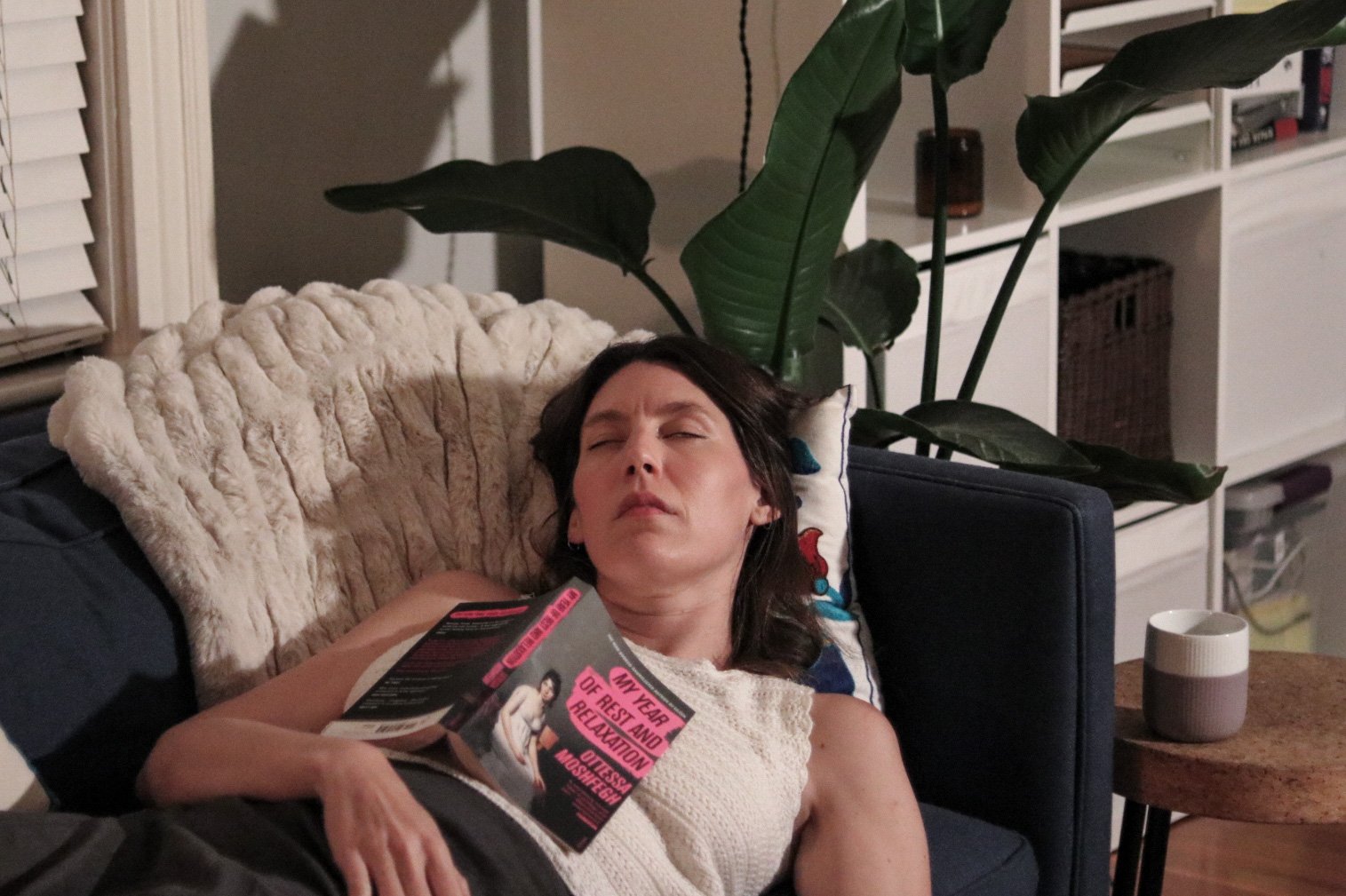My Year of Rest and Relaxation Book Reflection
I finished reading My Year of Rest and Relaxation by Ottessa Moshfegh, published in 2018.
My friend CJ sent it to me knowing I'd need to rest and relax as my broken ribs healed from the bicycle accident last month. This book is often mentioned as a favorite on TikTok book discussion threads so I was delighted to receive it by surprise in the mail!
It follows a young, pretty, nameless protagonist's year, mid-2000 to mid-2001, of addiction to opioids—which, being very wealthy, she has the privilege to call "sleeping aids" rather than the "hard drugs" that they are. She lives on the Upper East Side of Manhattan, probably the most boring neighborhood in NYC, is a recent graduate of Columbia with a degree in Art History, and has just left her job at a vapid and pretentious avant-garde art gallery in Chelsea—one that relies on shock value to entertain. Throughout the novel, Moshfegh won't let the reader release the particularly disturbing image of the brutality of one show featuring taxidermied dogs as art.
I was a life coach for 5 years and this book reminded me of how difficult it was to coach those born into wealth (I'm sure someone has figured it out but it wasn't me). They might set a goal, then when we'd check in a week later, shrug off the fact that they didn't do it—"it doesn't matter." It was hard to get to the heart of what mattered. Comfort has that effect on us.
Compounding the ennui of the Kate Moss-esque main character was the heartbreaking indifference her parents had felt about her all the way up until their respective dying days. A scene in which the protagonist sits beside her dying father, finally finding tears for him and trying to express care, only to have him ignore her entirely was deeply sad. The pain from that kind of rejection by the ones who were supposed to love us the most cuts right to the bone.
The scenes with her narcissistic parents help us understand why her reaction to every person or situation is on a stunted emotional spectrum scale that goes from annoyance to neutrality. She receives a generous gift from another character and later receives a succinct but heartfelt note about it, prompting her to immediately take the gift and drop it off at the Goodwill uptown. "For God's sake, just keep something around for sentimentality!" I screamed in my head, wanting to reach through the pages and give her a little shake by the shoulders.
She manufactures her own discomfort in the form of a year-long sleep experiment—how many hours can she spend unconscious in a year? Which, of course, is a great metaphor for how she's already experiencing reality.
The novel does a great job of telling the story of just how insane the 20-year prescription opioid blitz was (approx. 1996-2017), through the character of the whacky, aloof psychiatrist-turned energy-worker writing order after order of Xanax, trazodone, and a whole myriad of new and exciting medications without a second thought about their potential to destroy lives—indeed that thought didn't really exist until just a few years ago, after the death of over a 1/2 a million Americans.
Ultimately, the novel tells a story about the depths of depravity when we don't care about each other. "Occasionally, over the years, when I'd felt abandoned and scared and hear a voice in my mind say, 'I want my mommy,' I took the note out and read it as a reminder of what she'd actually been like and how little she cared about me." A scene in which her art history professor makes her stand in front of the classroom with her broken $500 black suede high-heeled boots so that the class can discuss what she represents symbolically shows how easy it is to dehumanize in one swift, callous action.
When we don't care about each other, the result is relationships about sex and status and not love, vacuous art shows full of "important" people, and scoffing at others' enjoyment. "He and I agreed that people looked stupid when they were 'having a good time,'" Nameless shares.
"Speculation and opinions drove not only the market but the products, sadly, the values of which were hinged not to the ineffable quality of art as a sacred human ritual—a value impossible to measure, anyway—but to what a bunch of rich assholes thought would 'elevate' their portfolios and inspire jealousy and, delusional as they all were, respect."
The nameless young woman's self-awareness is what drives the reader to keep turning the page, despite how shallow and horrifying she is.
The book is a good study of the mindsets that have led us to this moment in human history in which we have reached the precipice of no return with the climate crisis. In July of this year, we reached a milestone that should be scaring the wits out of us—1.1 degrees of global warming, the hottest month on record, making the impending reality of extreme heat, flooding, drought, wildfires and food and water shortages a certainty if we do nothing to correct course. The greedy, short-term high-seeking, convenience-based, commodity and status-worshipping culture we've created is eating us alive—or rather, cooking us alive.
Through exasperation with every character and scene in this novel, the reader finds within themselves that which really matters and is reminded that care, love, and presence are worth fighting the current of our materialistic culture for.


